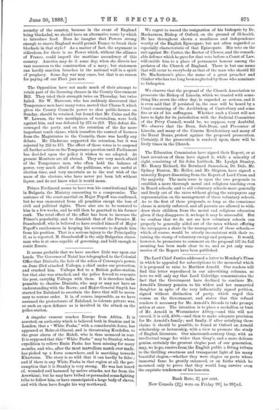The House of Commons on Wednesday rejected the Channel Tunnel
(Experimental Works) Bill on its second reading by 307 to 165, a division the more remarkable because Mr. Gladstone made a speech for the Bill, explaining that his own Government, when opposing the Bill, had yielded to a popular pressure which he thought had passed away. The Ministry did not, however, leave the question an open one, as Sir E. Watkin had imagined, from some talk with Mr. W. H. Smith, that they intended to do. We have discussed Mr. Gladstone's arguments elsewhere, but may mention here a new one brought forward by Sir E. Watkin. He maintained that the Tunnel would actually increase instead of decreasing the
security of the country, because in the event of England being blockaded, we should have an alternative route by which to introduce food. Does he imagine that Powers strong enough to starve England would permit France to break their blockade in that style P As a matter of fact, the argument is ridiculous, for there is no Power which, without the alliance of France, could imperil the maritime ascendency of this country. America may do it some day, when she directs her vast resources to the construction of a navy; but statesmen can hardly sanction breaches in the national wall in a spirit of prophecy. Some day war may cease, but that is no reason for paying off our Fleet just now.



















































 Previous page
Previous page